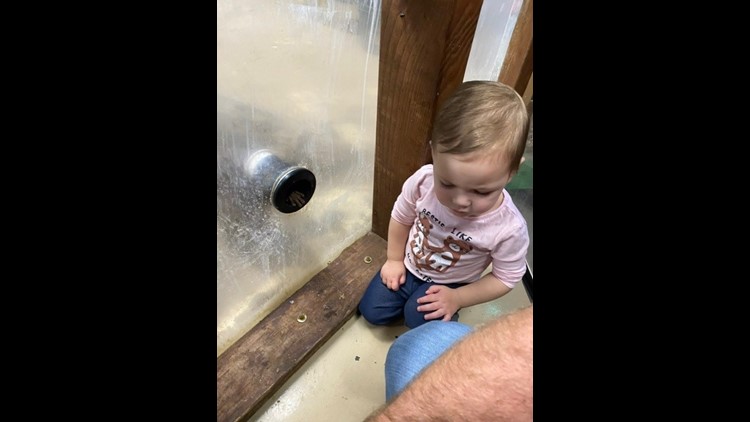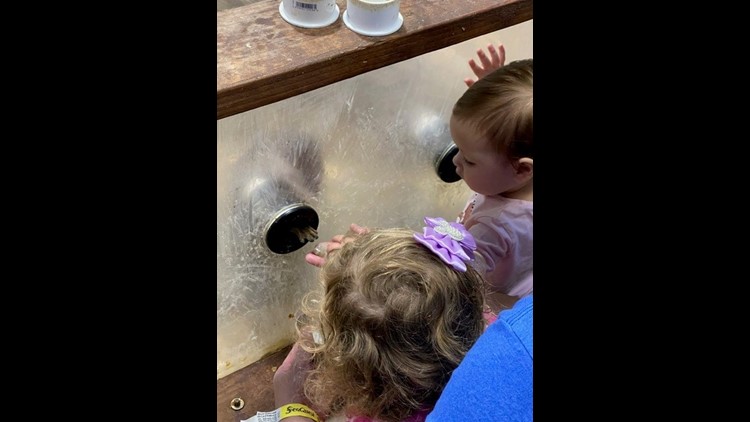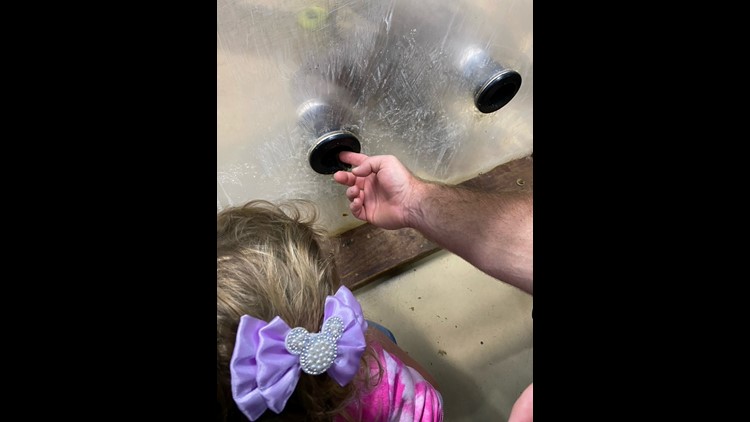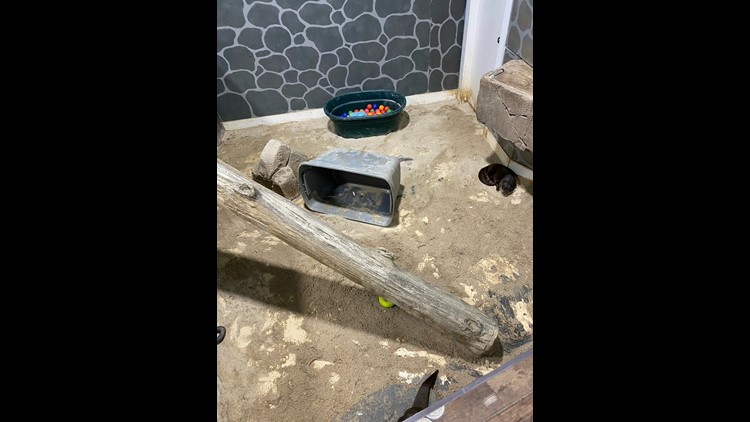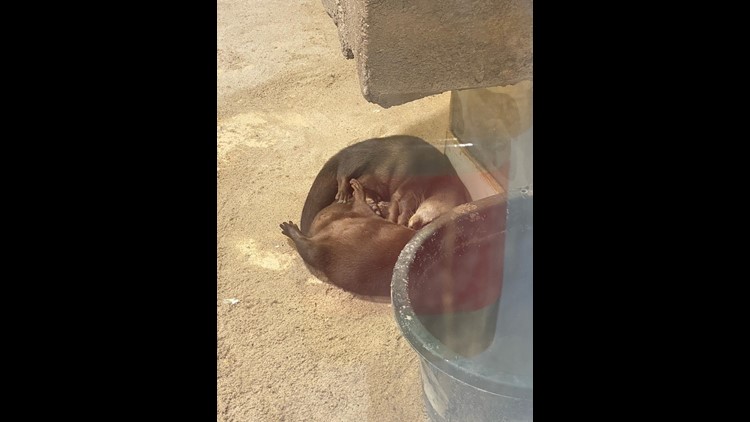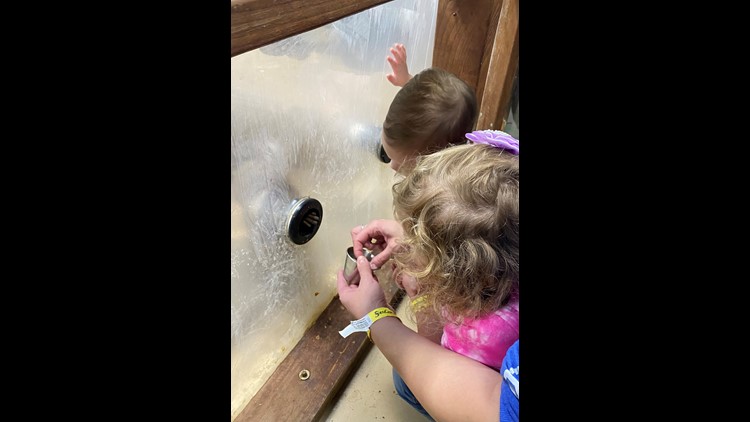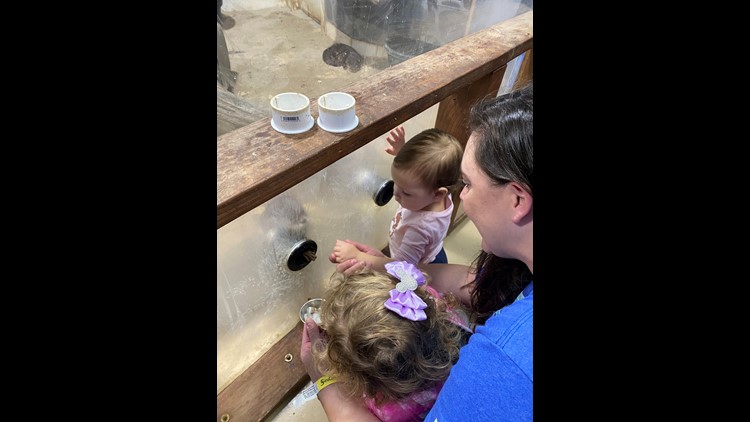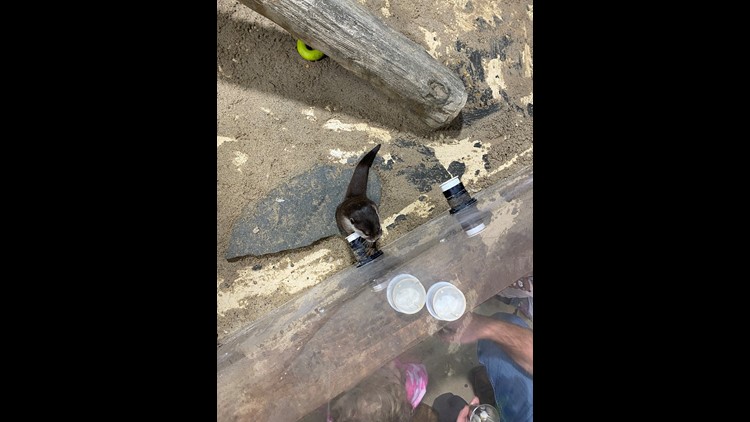FOLSOM, Calif. — Costa Rica is a country known for lush jungles and tropical rainforest. More than 500,000 wildlife species call it "home," including the sloth.
Yet some of these nocturnal, tree-dwelling creatures are 4,000 miles away in Folsom, California — in a mall — which was surprising to Amanda Turner.
"I guess I kind of expected things more along the lines of a zoo or the Monterey Bay Aquarium where you walk in and it's just... just a certain way about zoo or animals," said Turner. "It was like walking into a shopping center that they had emptied out the clothes and shoved a bunch of animals in."
Turner's family went to SeaQuest for the otters. Her two young daughters love the marine mammal.
"We couldn't even see the animal we were feeding," said Turner. "It was like a tube that came through the glass and you just saw a little hand stick out and you hand it food. It was absolutely filthy and the smell was horrendous."
SeaQuest Folsom Otters
SeaQuest is a national chain with seven locations across the United States, advertised as "interactive aquariums."
But it's not just fish. The company prides itself on having wild animals from five different continents at the Palladio in Folsom, the only SeaQuest location in California.
"I was just overall disgusted with the conditions — the smell, how they were treated," said Turner.
So, ABC10 decided to go to SeaQuest to get a first-hand look. As we walked through, we saw animals living in refrigerator-size enclosures with little reprieve from customers. No windows. And a whole lot of people, even swimming in tanks with sharks and stingrays, as well as having birthday parties with dozens of kids.

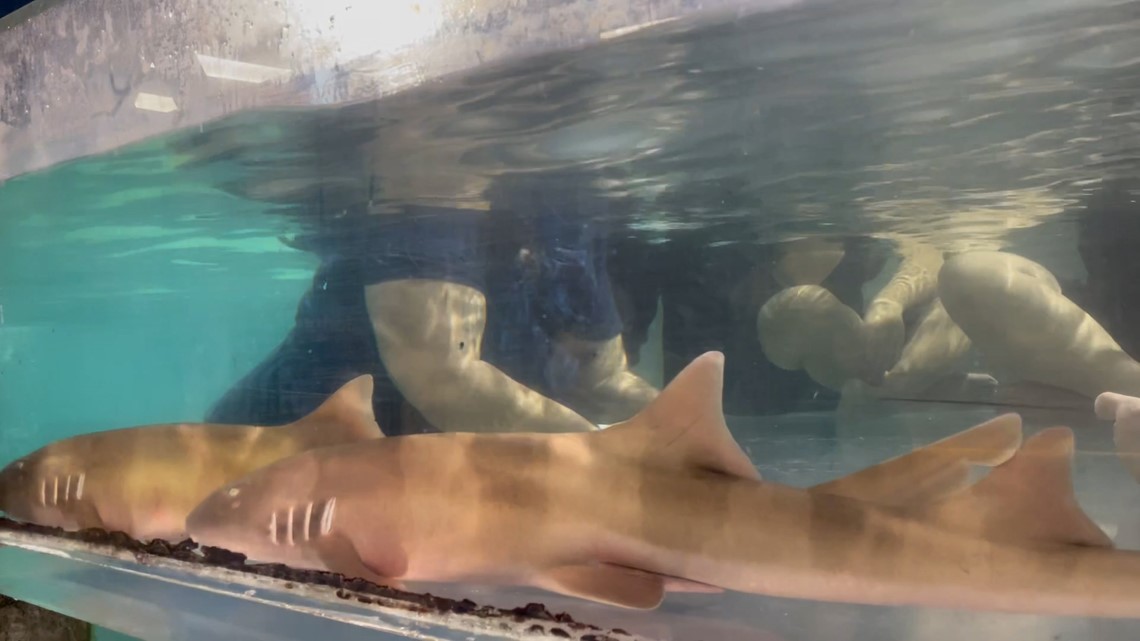

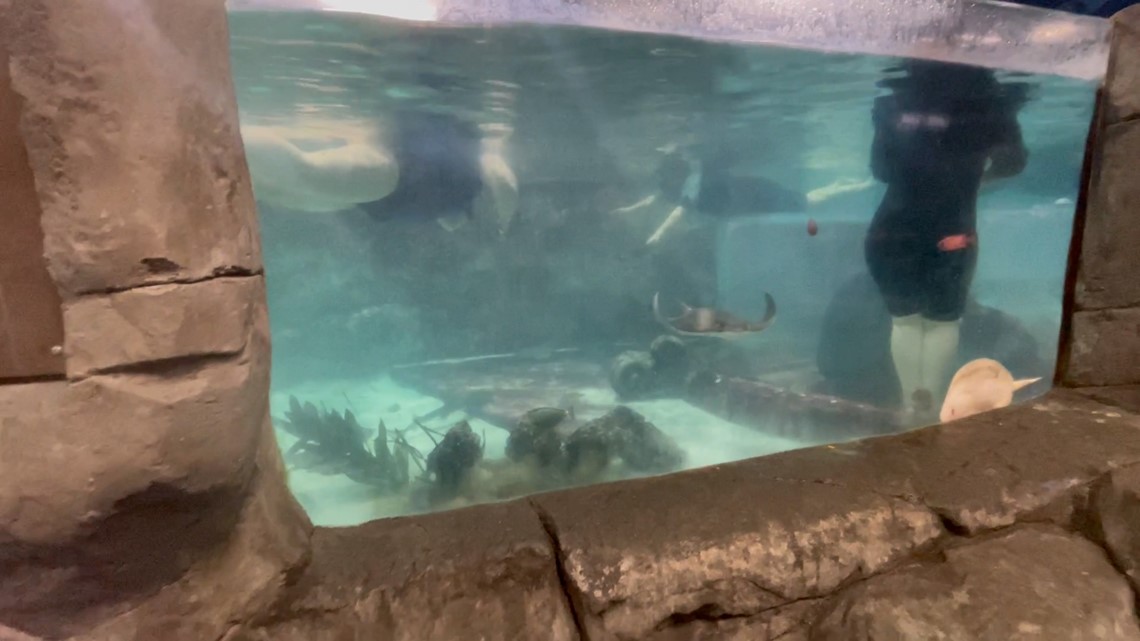
It's what a former SeaQuest employee saw every day.
"No fresh air, no sunlight, no nothing... They didn't have anywhere to go," she said about animals being unable to get away from the constant presence of customers, who would wait in lines wrapping around the building, she recalled.
Worried about retaliation, she asked ABC10 not show her face but wanted to share her experience working at SeaQuest. For reporting and anonymity purposes, we'll call her "Jane."
Jane came to SeaQuest Folsom after working at a zoo. She thought it'd be the perfect fit, but during her initial interview she said she noticed the small enclosures for animals right away. After she was hired, the concern grew to more and more issues, she said.
"The sloths, they come from Costa Rica, Belize, humid (places) - very rainforest-y. The humidity is up to 90% sometimes," said Jane. "So, if they don't get that humidity, they could actually die."
The humidity levels for sloths were way too low. A 2023 citation by the United States Department of Agriculture (USDA) found they were as far as 34% below what they should be at SeaQuest Folsom.

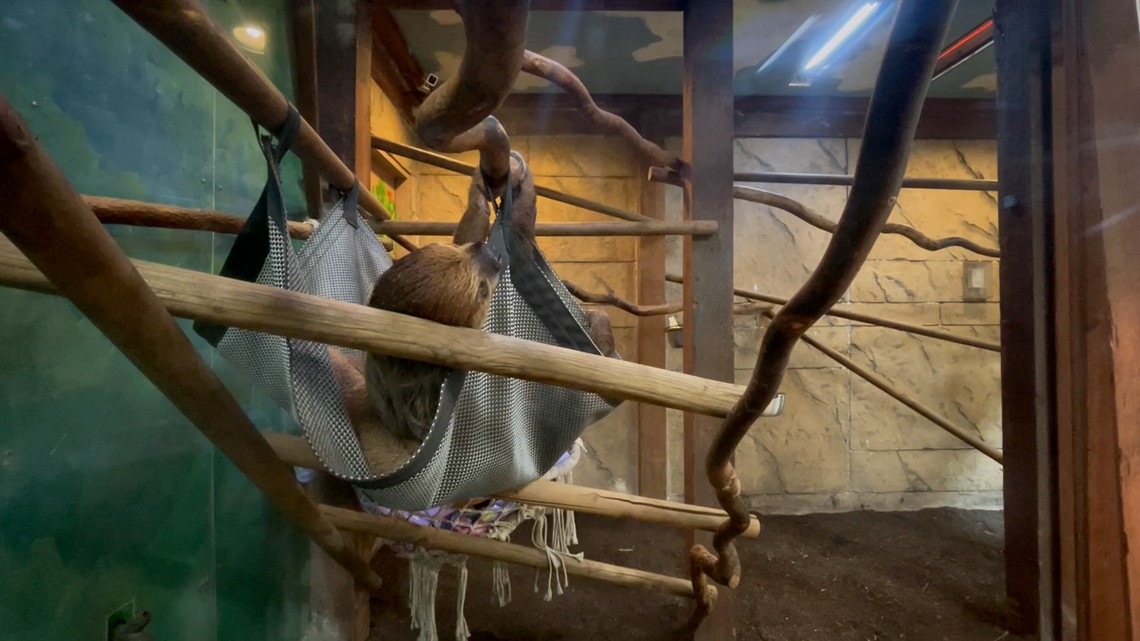
"They just start shutting down," said Jane. "Their bodies can't handle it."
That's not all. When a fish jumped out of a tank there, two minutes passed before employees returned it, a 2019 video from PETA showed.
And in 2023 alone, records show the USDA cited SeaQuest after finding the Folsom location storing toxic cleaning chemicals near bird food, an "abundance of flies," an open electrical socket in an animal enclosure and not having records on where or how they got birds.
Those citations are just for the Folsom SeaQuest location. Records show in the past five years, SeaQuest facilities were cited more than 80 times by the USDA for issues including human injury, potential disease hazards and inadequate care of animals.
In collaboration with ABC News, we asked SeaQuest for an on-camera interview. They declined.
In regards to USDA citations, SeaQuest said their locations are "host to millions of visitors each year. With hundreds of employees and thousands of animals, injury, and mortality, though very rare, exist."
"We continually implement training and procedures to ensure we are working to prevent citation," SeaQuest stated. "All locations complete USDA daily and weekly audit checks in keeping with regulation and requirements."
As for the lack of daylight, SeaQuest said their "lighting and exhibit design include the use of UVB lights, which gives the animal the same benefits that the sun does and ensures proper health is maintained."
In response to animal enclosure sizes, SeaQuest said their exhibits are "sized and developed in a way that ensures the animals have adequate room for their health and mental stimulation."
As for how SeaQuest gets animals?
"I don't know where they came from," Jane said.
Records show in 2013, Ammon Covino — the brother of SeaQuest CEO Vince Covino — was sentenced and spent time in prison for animal trafficking.
The company said Ammon "has not ever been, nor is currently, involved in any way with SeaQuest."
Yet according to the U.S. Department of Justice, he traveled to Las Vegas and Layton, Utah in 2016 — both locations where SeaQuest facilities are — to provide "consulting" services on aquariums. All while lying to his probation officer about the travel, the Department of Justice said in a press release.
SeaQuest said it gets its animals from "rescues, donations, and acquisition of surplus animals from other zoos and aquariums" as well as "reputable breeders," noting "all endangered species at SeaQuest are captive-bred."
"That was one of my initial concerns is where they came from," said Jane. "No one would ever really say it."
Yet out of all her concerns, Jane's biggest worry at SeaQuest Folsom was people's interactions with animals.
"Because the interactions are the ones that pay the bills," said Jane.
It costs $25 to get in SeaQuest's door. To feed animals, you buy tokens you then put in food vending machines distributed throughout the facility. To pet animals, customers have to pay for an "interaction."
Signs in SeaQuest Folsom showed it costs $50 for a "sloth interaction."
"They would try to book as many interactions as possible," said Jane. "So, you're thinking thousands of dollars in a day."
Jane said the USDA has regulations for animals and that each animal is supposed to have breaks.
"There was no real breaks," said Jane. "Booked them back to back to back to back."
This makes the animals anxious, Jane said. She recalled a wallaby that wouldn't stop shaking.
"They did take the wallaby to the vet, did have bloodwork done to see if there was any sort of neurological thing going on — no. It was definitely from stress," said Jane.

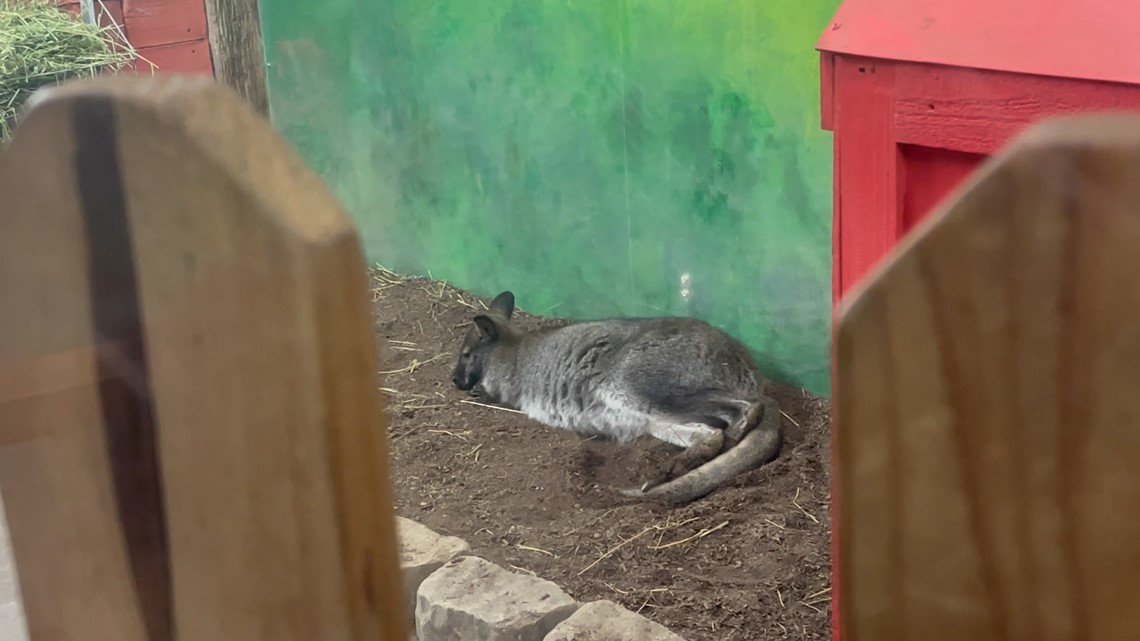
In their written response, SeaQuest said they "adhere to all USDA-required breaks, giving our animals break time equal to the time they spend doing interactions that provide enrichment and stimulation for the animal" and that they "never force animals to interact; if they do not voluntarily exhibit a desire to interact or show any signs of discomfort, the interactions is suspended."
That's not what ABC10 witnessed during our visit. During the parakeet interaction, the birds were not coming to customers or and didn't appear interested in eating the customer's food. A SeaQuest employee responded saying:
"They are full. They are tired. So, I'm going to give you guys two options. You can leave now and I'll return your token. Number two - stay in here (inaudible) and we keep trying."
Jane said employees were encouraged to prioritize interactions over animal care. Since SeaQuest was always short-staffed, she said, it was hard to keep up the care for the animals.
“I feel we were at least a day behind, at least every single day,” said Jane.
When SeaQuest Folsom opened in 2018, protesters were outside. ABC10 was there and got a tour with CEO Vince Covino who said this...
"There's always room for improvement. We're taking all the measures, we've done extensive training."
In response to this investigation with ABC News, the company said “the number one priority for SeaQuest, above all, is to ensure the health and safety of our animals and provide a high quality of life.”
Jane disagrees. To her, cash was king of the SeaQuest jungle and the animals' quality of life was sacrificed, so much so she said she saw a few animals die during her time working there.
SeaQuest said the “vast majority of animals’ deaths have been from natural causes," but they did not provide a number, despite saying they have “official documentation” of each death.
The true number of animals that die at SeaQuest is unknown, the United States Humane Society said.
“Animals do die and they’re replaceable in just a few minutes because they can just get a new one and name it the same thing,” said Jenny Berg, the California State Director for the United States Humane Society. "I think SeaQuest is a recipe for disaster.”
The national organization believes change is needed for all SeaQuest locations — especially in California, Berg said — adding SeaQuest does not "belong in our state and in the city of Folsom."
"I don't think that this business is aligned with California values," said Berg. "We've worked so hard to protect animals in many different ways in California, so to go there and see this is happening in our state is particularly disappointing."
But in order for change to happen, it's not just California, it's needed from a federal level, Berg explained. That's because the Animal Welfare Act is the federal law regulating how animals are treated. Berg said SeaQuest is violating it.
"The Animal Welfare Act is really basic standards — they need to provide water, they need to provide healthy food — and it's really not enough," said Berg. "You can see that in places like SeaQuest, the cages are so small."
The USDA is in charge of enforcing the federal law.
"I don't think they're really going out there and seeing what's going on in these facilities," Berg said. "I don't think SeaQuest really cares (that) they're getting these citations."
That's why the USDA needs to do better, she said.
In a statement to ABC News, the USDA said it takes its responsibility to uphold the Animal Welfare Act “very seriously” and they “conduct inspections and work with facilities to ensure they are in compliance with regulations under the AWA.”
For businesses and people found outside of compliance, the USDA’s investigative process “may lead to enforcement action such as letters of warning, monetary penalties, license suspensions and revocations.”
The USDA’s full statement can be found at the bottom of this story.
"I truly believe SeaQuest puts money above animal welfare," said Berg.
While a SeaQuest in Connecticut closed in August 2023 shortly after the USDA issued violations, the Humane Society said it's not enough. The Animal Welfare Act needs to be changed... strengthened. Until then, SeaQuest will operate the same.
It's an operation that may also be causing harm to humans. ABC News found at least 70 incidents reported on or cited by state or federal agencies of people getting hurt at SeaQuest facilities nationwide.
“Next thing I know, I turn around because she’s screaming because the thing came completely out of the water and got her hand,” said Michael Distad.
Distad said his four-year-old daughter was bit by a trout, drawing blood. He said when he alerted SeaQuest Folsom staff, they acted caring toward his daughter but it didn't seem to come as a surprise.
“The feeling, the sentiment, was that it does happen,” said Distad.
That’s true, Jane said, especially when animals are forced into interactions.
“The iguanas are humongous… some of them don’t want to be touched. What they’ll do — their behavior is — they’ll swish their tail and it’ll smack a kid,” she said. “The Bengal cats, they don’t want to be messed with, they’ll lash out.”
In four years, between November 1, 2019 and November 1, 2023, records show the Folsom Fire Department was called to SeaQuest 18 times — that’s over four calls per year. And 15 incident reports have been filed with Folsom Animal Services in five years between November 1, 2018 and November 1, 2023.
SeaQuest said “guest injuries are taken very seriously. When an accident involving a guest occurs, our immediate priority is to address any injuries sustained. Our staff are trained to remain calm and triage the situation. They gather comprehensive details and complete an incident report. Guests receive necessary medical attention promptly."
They also noted “all incidents, however minor, are meticulously documented” but did not provide an answer to our question of a specific number of times customers have gotten hurt.
But Jane said when customers get hurt, it’s the animals who ultimately pay the price.
“When the cat scratched the kid, the cat had to be put into quarantine,” said Jane. “(The cats) they’re brothers - they don’t want to be apart, one would cry without the other one. They put the one cat that scratched the kid in a small crate for 10 days where his litter box was spilling into his water. It was awful.”
Jane's last straw was Nutmeg — a massive Flemish rabbit with a small enclosure, she said.
"She sits in her litter box. She is a big girl with lots of fur and her bottom area was covered in feces, just so matted," said Jane. "I don't even think she can defecate."
Management's response?
"It was just, 'Nope. We've got interactions to do,'" said Jane.
SeaQuest responded saying Nutmeg’s enclosure has “been approved by the State of California Fish and Wildlife Department, the USDA, local animal control regulators and several licensed veterinarians” and that she has a “strong desire to sleep in her litter box.”
For her own wellbeing, Jane said she walked away shortly after her year-work anniversary at SeaQuest Folsom.
"It broke me. I cried for a couple weeks. I still think of them," said Jane.
She doesn't just think about these animals. In this interview, she spoke for them.
"Doing this (interview), it gives me peace of mind," said Jane. "Hopefully it makes a difference."
USDA Full Statement to ABC News:
APHIS takes its mission to ensure the humane treatment of animals covered by the Animal Welfare Act (AWA) very seriously. We continue to conduct inspections and work with facilities to ensure they are in compliance with regulations under the AWA. You may access inspection histories for all of our licensed facilities on our public search tool. When we find issues that bring facilities out of compliance with the AWA regulations, we work hard to bring them back into compliance as quickly as possible. Our investigative process for individuals and/or businesses found out of compliance with the AWA may lead to an enforcement action such as letters of warning, monetary penalties, license suspensions and revocations. Additional information on APHIS’ Investigative and Enforcement Process can be found here.
ANOTHER INVESTIGATION FROM ABC10 ORIGINALS: Klamath dam removals--what's at stake with the world's largest dam removal project.



